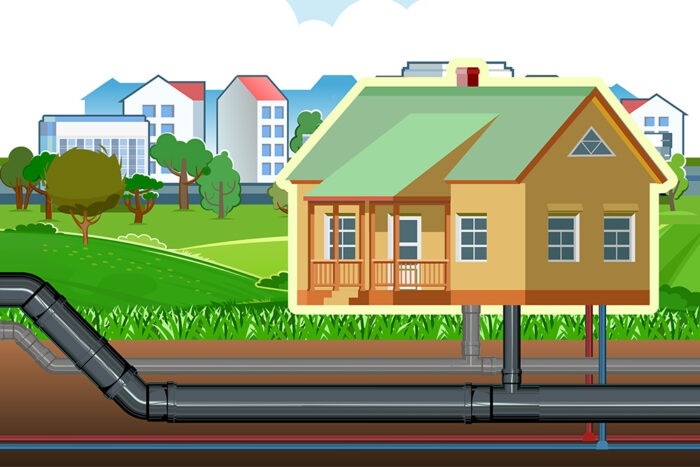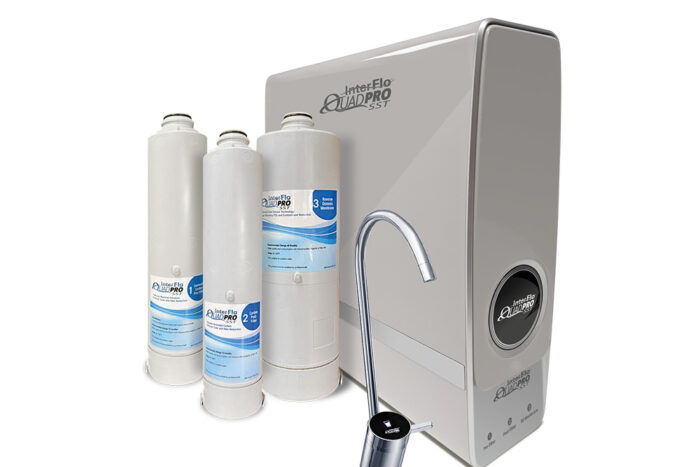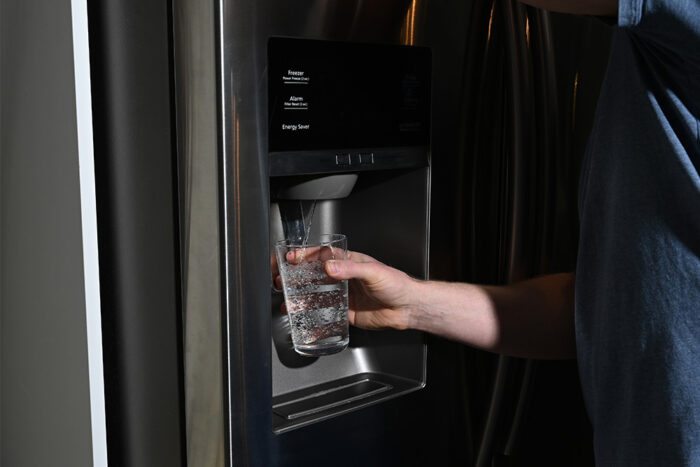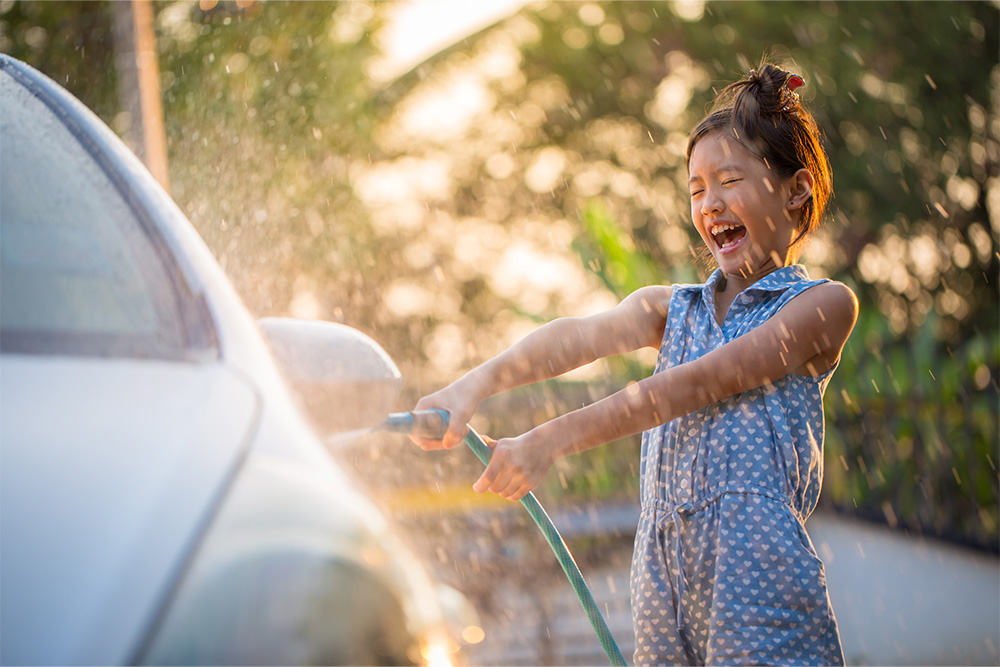The average American family uses more than 300 gallons of water per day at home. But, have ever wondered if you’re using the right water for the job? Are there certain types of water that are better for cooking, cleaning, bathing, or for your pets?
With water being such an integral part of our lives, it’s important to know the right type of water to use for activities and appliances. Here are six ways water is used around the home and how you can make the most of it.
Bathing
Whether you’re giving your kids a bubble bath or rinsing off after a day of yard work, your bathing will benefit most when you use soft water. Minerals found in hard water, like magnesium and calcium, react poorly with the ingredients in many body products, often leaving a ring of soapy residue around the tub and a sticky, dry feeling on your skin. Water softeners can help alleviate these issues. By removing problematic minerals, soft water allows soap to lather easier, leaving you with a cleaner feeling body and a sparkling shower.
Soft water can also improve the health of your hair, giving you smooth and shiny locks every time you shower. Hard water can leave your hair feeling dry, coarse, and frizzy. This is because when mixed with shampoo, minerals found in the water form a curd-like substance that sticks to your hair, similar to how soap scum sticks to the walls of your shower and tub. In addition, soft water requires less soap to achieve a clean feeling scalp and can actually balance the pH level of your hair.
Soft water can also help you save money on your energy bill without even cutting down on shower time. That’s because the removal of minerals makes heating water in the home quicker and easier, leading to a reduction in energy use. In fact, when used with soft water, gas water heaters have been proven to be 29% more efficient.
Fish Tanks & Aquariums
Whether you have a one-gallon bowl for a goldfish, or a 40-gallon saltwater aquarium, a great deal of effort and water is needed to maintain the health of your fish and their habitat. Maintaining excellent water quality for your fish involves regularly testing the water and changing it on a weekly basis.
To promote fish health and keep your tank in top working condition, it’s important to use the right kind of water. Freshwater and saltwater tanks require a specific pH in order to maintain fish health. Too many or too few minerals can cause drastic changes in water’s alkalinity and hardness, which can change the pH.
While aquatic enthusiasts may disagree on favorite species, one thing is for certain – water from the tap should never go straight into the tank. To provide a safe environment for your fish, consider the convenience of a filtration media that works with your tap water to remove chlorine, chloramine, hardness, and other organic compounds that can be problematic to aquatic species. Filtration systems can keep your aquarium clean for longer and offer better balanced water for your fish.
Reverse osmosis (R.O.) water can also help keep your aquarium looking fresh and maintain the health of your aquatic species, as it removes impurities that can be problematic to fish. When using R.O. water in an aquarium, you can re-mineralize the water so it is ideal for specific species of fish.
Humidifiers (Room and Central “Whole Home Humidifiers”)
Available in a variety of sizes, humidifiers help to put moisture in the air to improve your immune system, skin, sleep, and even keep houseplants healthier. Portable, plug-in room humidifiers are typically low in cost and can be purchased at most retail locations.
Large, whole home humidifiers, also known as central humidifiers, differ from room humidifiers as they require a water supply pipe to be attached to the furnace duct of a central forced air heating system. This connection provides a constant water supply to the humidifier’s reservoir; which automatically refills when low.
Much like other appliances in the home, hard water is problematic for the heating element inside humidifiers. Minerals in hard water can also create a “white dust” residue on furniture. Hard water can also promote bacterial growth in the humidifier and cause lung irritation when mineral dust is released in the air.
For room humidifiers, most homeowners find distilled water works best. However, using soft water can also increase the effectiveness of room and whole home humidifiers with minimal maintenance. Soft water can help reduce the amount of mineral build-up and keep the humidifier functioning properly.
Cooking, Baking, and Brewing
From preparing family meals to home brewing beer, water use is important in the kitchen. Whether you have municipal water or a private well, the hardness of your water and the amount of chlorine and other chemicals can affect the taste of food and quality of your beer, coffee, and other drinks.
Hard water can lengthen preparation time and alter overall flavor of your meals. Hard water increases the boiling point, which can affect the cook time for foods like beans and rice. Due to the excess minerals in hard water, some people may notice a slight change in how foods taste when used to make meals.
Your water can affect baking as well. If your muffins are turning out flat or your brownies are failing to rise, your water might be to blame. Dissolved minerals found in hard water can change the structure of gluten and hinder how ingredients like yeast function, causing dough to become tough and rubbery.
If brewing beer is your hobby, it’s important that you have the right water to start the process. This goes beyond the basics of hard and soft water. In fact, the entire chemical makeup of your home’s water plays a role in how your brew turns out. Calcium, magnesium, sodium, chloride, and even sulfates can alter the alkalinity, clarity, and flavor of your beer. Since the art of home brewing begins with water, knowing what’s in your water supply is crucial to crafting the perfect brew.
The same can be said for coffee lovers who appreciate the aromatic goodness of the perfect cup. From light to dark roasts, and flavors mild to bold, preference in coffee flavor and strength varies from one person to the next. While some may argue that certain minerals help give coffee an earthy, woodsy taste, most people can agree that too hard of water results in awful tasting coffee. Having the right type of water at the tap can help homeowners brew the perfect cup of joe each and every time.
Chefs, bakers, and brewers alike can all benefit from installing an R.O. system in their homes. R.O. systems remove contaminants and minerals from your water, leaving you with a clean and refreshing product perfect for soups, cakes, and beverages. Learn more about the benefits of R.O. water here.
Washing Cars
Staying clean isn’t just for your skin. Many individuals prefer to skip the automatic car washes and wash their vehicles by hand in the driveway. Whether you choose to hose off your car or wash with a sponge and buckets of sudsy water, Americans on average use between 40 and 140 gallons of water each time they clean their vehicles.
Much like bathing, certain types of water are better at washing your vehicle. Professional car washes often use R.O. water to get the job done. Because R.O. water systems remove total dissolved solids found in soft water, combining presoaks and detergents with R.O. water leaves vehicles spot-free and shining like new.
Washing your vehicle at home is no different, as RO and soft water allow detergents and soap to foam easily, helping to penetrate dirt, oil, and other debris on your car. For homeowners with hard water at their hose faucets, another simple solution for a sparkling car is to towel dry your vehicle to avoid spotting caused by minerals in hard water or the sodium in soft water.
Pet Hydration
Soft water has endless benefits for your home and body, but what about your furry family members?
While calcium, magnesium, iron, and other minerals found in hard water shouldn’t cause harm to an animal’s health, a recent study suggested a correlation between frequent veterinarian visits for urinary issues and areas of the United States with extremely hard water.
Water softeners help to remove minerals found in hard water, but have the tendency to alter the taste of your drinking water. Just like people with a preferred palate, dogs and cats are no different when it comes to detecting a change in taste.
If your home has soft water and your pet is skipping the water dish, you may want to consider an alternative. An R.O. system is known to provide some of the best tasting water and may be a great fit for your home if water taste is an issue. Learn more about R.O. drinking water systems and the benefits here.
The Right Water Treatment System for All Your Household Needs
No matter how it’s used around the home, it pays to have the right water. From R.O. systems, water softeners, and filtration media, your whole home will benefit when you install the right water treatment system.
Our experts at Water-Right can help give you the right water for life. Connect with us today to learn more about our products and services that can help give you the best water for all your needs.
Find the right contractor for you.
Recent Homeowner Resources

Are You Drinking Contaminated Water? New Rules Help Homeowners Identify Lead Risks

Introducing InterFlo® QuadPro SST!



